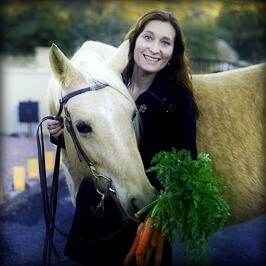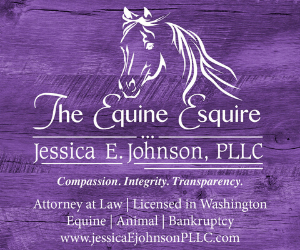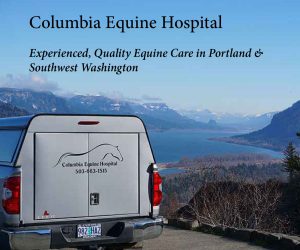How to Determine if You’re Saving Money
by Gina Fresquez, M.S., CHHC
With quality hay prices reaching an all-time high here in the Pacific Northwest (avg. $18/bale) many horse owners are looking for alternative hay sources that won’t break the bank. Some may even be tempted to ditch that high quality, higher priced hay to seek out lower quality alternatives grown in their area, and believe they have struck gold when they find hay for $7/bale. Keep in mind there are some things to investigate and consider before changing your feeding program and filling the hay barn as it may not be as good as it seems. You may actually be spending more money in the long run. It all boils down to cost per horse, per day to maintain condition and performance, as well as knowing a few tips to evaluate forage for your horse.
First, the quality of that hay should be evaluated to determine its benefit to your horse. Investigate what type and maturity at time of harvest (important for determining quality). A lot of local hays in Western WA and OR are mixtures of different grasses that can become very stemmy and full of weeds. This may indicate higher indigestible fiber which can decrease nutrient availability, creates excess gut fill and that dreaded “hay belly.” When a horse eats forage of this quality it provides low nutritional and caloric value, causing higher consumption to maintain its health and condition. Now that $7 bale of hay went from costing you $3.85/horse/day to $4.73/horse/day (based off the avg. requirement for 1000 lb. horse).

Ideally, the most accurate way to determine hay quality is by getting it tested, but this analysis will add to the cost. It is also not as simple as taking a handful of hay and sending it off to the lab. To get an accurate analysis you must appropriately obtain hay samples by utilizing a hay probe on 12-20 bales (www.equi-analytical.com). This report will give you the calorie, protein, sugar, starch, fiber, digestibility and mineral content of the hay. Unfortunately, this process is not always feasible if you only purchase a few bales at a time. If this is the case, utilizing a standard visual quality inspection by evaluating color, cut, smell, stage of maturity, leafiness and free from foreign material is a great start. My tip is to grab a handful of hay in your hand. If it is soft and pliable, great. If it pricks your hands, pass as it will do the same thing to your horse’s mouth.
Secondly, your horse can be a great indicator of the quality of the hay you feed it. You may notice that over time your horse’s performance, condition and body weight begins to decline. Ask yourself these questions: Will he eat or clean up all his hay? Does he have to eat more of this hay to maintain weight? Has the quality of his hair coat and/or hooves declined? Has he lost weight and/or muscle tone? Has he developed a hay belly? If you answered yes to any or all of these, the quality of hay may not be very valuable to your horse. You have two options: feed better quality hay or feed low quality hay with supplementation (additional cost). Let’s break down some examples: (for the average 1000 lb. horse, 20 Mcals/day):
- 20 lbs. low quality hay with 3.6 lbs. of grain per day = $4.94/horse/day
- 18 lbs. high quality hay with 1.3 lbs. of a good ration balancer supplement per day = $4.38/horse/day
Feeding higher quality hay (#2) is saving you almost $0.60/horse/day, $18/month and $216/year.
This is not to say ALL local hays are lower quality. In my travels I have come across a wide variety of hays grown in the northwest. Do your homework and investigate. Remember, if it seems too good to be true, it most likely is. Over time you will be able to determine the quality of the hay by how well your horse maintains on it. If for some reason you are having difficulty finding good quality hay you can also utilize complete feeds that have quality forage built in to supplement and stretch your hay supply.
No matter what you feed, cheap is not always better and low quality hay can cost you more in the long run.
Contact Gina and find out more information: *www.ginawellness.com, www.horse.purinamills.com.
Cell: (206) 743-6453
Email: [email protected]
*This link was no longer active at the time this article was added to the website in 2018.
Published June 2013 Issue
Gina Fresquez, MS, is a lifelong horse enthusiast with a passion for helping horse owners make sense of equine nutrition. She received her BS in equine science and Master’s degree in equine nutrition from the University of Arizona and has worked as a technical equine specialist for Purina Animal Nutrition since 2006. Gina works closely with horse owners, stables and veterinarians determining feed rations, testing hay, and addressing nutritional related challenges in the Pacific Northwest.
Contact Gina and find out more information: www.horse.purinamills.com.
Cell: (206) 743-6453
Email: [email protected]




